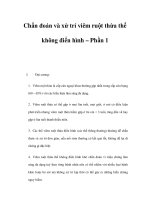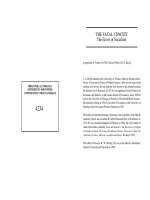THE ASSERTIVENESS POCKET BOOK phần 1 pot
Bạn đang xem bản rút gọn của tài liệu. Xem và tải ngay bản đầy đủ của tài liệu tại đây (76.66 KB, 10 trang )
THE
ASSERTIVENESS
POCKETBOOK
By Max A. Eggert
Drawings by Phil Hailstone
Dedication
This book is dedicated to my son, Max Charles, who, in spite of my influence, is very much his own man
and, for one so young, has developed his own way of being assertive. Max, I’m proud of you.
Thanks to Donna Coiera for transforming my handwriting into an acceptable WP format.
“Will appeal to anyone in human resources or management training. It is successful in keeping
jargon to a minimum without loss of precision. The concepts are immediately relevant, and
each page will offer you a new idea, a new skill or a new way to look at a situation.”
Louise Campbell, Associate Director, Human Resources, Societe Generale Australia Ltd.
“This pocketbook provides at a glance the skills required for a lifetime.”
Tracey Luscombe, Human Resource Manager, Manchester Unity Friendly Society in NSW.
CONTENTS
INTRODUCTION 1
Definition, popularity, with whom can
you be assertive, why now, when to use
it, assertiveness and integrity, keeping a
balance
THREE BEHAVIOUR TYPES 9
Three options, non-assertive behaviour
(reasons, mind games, musts and
obligations, self talk, inner voices),
aggressive behaviour, assertive
behaviour (advantages, liberation
circle, affirmations)
RIGHTS & RESPONSIBILITIES 35
Definitions of basic assertive rights,
corresponding responsibilities, rights
and responsibilities at work
ASSERTIVENESS SKILLS 53
Body language, receiving and giving
criticism, receiving positive feedback,
disagreement process, ‘I’ statements,
asking for what you want, broken record,
negative assertion, fogging, negative
enquiry, power words
ASSERTIVE ACTIVITIES 91
General advice points, ten activities to
practise assertive behaviour
INTRODUCTION
1
ASSERTIVENESS
Enjoying your rights
Expressing your feelings
Asking for what you want
Stating your views
WITH
integrity
honesty
directness
respect for others
INTRODUCTION
DEFINITION OF ASSERTIVENESS
Assertive: (adj) confident and direct in dealing with others.
Collins Concise English Dictionary
Assertiveness is upholding one’s own integrity and dignity whilst at the same time
encouraging and recognising this behaviour in others.
2
INTRODUCTION
INCREASING POPULARITY
Assertiveness and the skills associated with it are increasing in popularity because:
● There has been an increase in individual freedom
● It empowers people who use it
● It encourages psychological health in those who use it
● In less hierarchical work structures, managing by rank alone is no longer effective
● More competition for resources makes it necessary for individuals to pursue
what they want
3
YOU
Your clients
Yourself
Your family
Your friends
Your network Your colleagues
Your team
Your managers
Your subordinates
INTRODUCTION
WITH WHOM CAN YOU BE ASSERTIVE?
In fact, assertiveness is useful for everyone with whom you come into contact.
4
INTRODUCTION
WHY ASSERTIVENESS NOW?
● Social and political hierarchies based on birth or caste are no longer successful
within capitalist structures
● Successful enterprises are based on meritocracy and need everyone to achieve their best
● To be successful, society requires all to make a contribution - no one person is
inherently better than another
● To speak one’s mind and to reveal one’s true position have been found to engender
psychological health and improved relationships
● At work the person doing the job is the one who can make the most significant
contribution to improvements on the job
● The political value and power behind the equality movement for gender, race, religion,
colour and ethnic origin are now integrated into the culture of western civilisation
● The full fruition of democratic principles of individual freedom, and the equal rights of
all within society, encourage all to pursue their rights and aims
● The New Age philosophy of individual empowerment and pursuit of personal
excellence encourages people to be themselves
5
In the face
of criticism
When you
want something
When you
want to negotiate
When you don't
want something
When you want
to give feedback
When you
are hurt
When you
are happy
When you
are angry
YOU
INTRODUCTION
WHEN TO USE ASSERTIVENESS
6
WITH SELF WITH OTHERS
What you feel
What you think
What you need
Their impact on you
Their behaviour
What you want from them
HONESTY
INTRODUCTION
ASSERTIVENESS AND INTEGRITY
When we are assertive we increase our integrity because we are honest with ourselves
and with others.
When we are honest with ourselves and with others we are able to achieve what we want
without compromise.
7
NEEDS OF OTHERS
OUR NEEDS
NEEDS OF OTHERS
OUR NEEDS
NON ASSERTIVE ASSERTIVE AGGRESSIVE
INTRODUCTION
KEEPING A BALANCE
In assertiveness we balance the needs of others with our own. We treat others as we
wish to be treated. When necessary we can choose whether to give priority to the needs
of others or choose to give greater consideration to our own needs.
WEAK : When we put all the needs of others before our own
AGGRESSIVE : When we put personal needs before those of others
ASSERTIVE : When we balance our needs and those of others and act
according to the priorities as we see them
8









